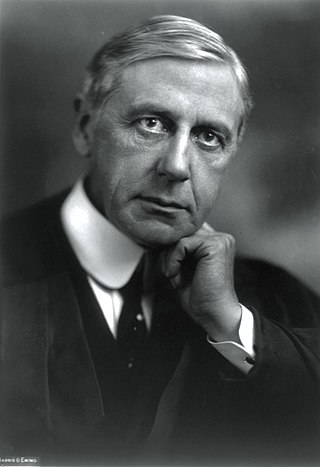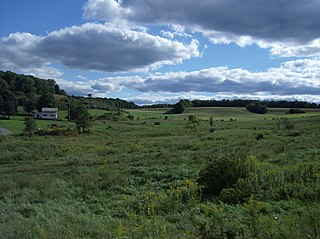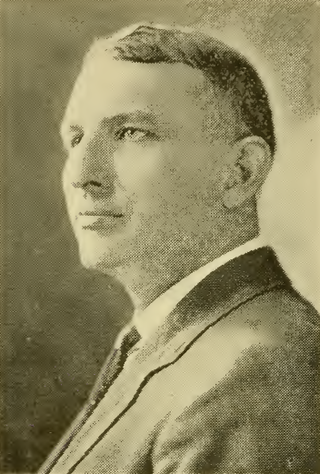
The Fourth Amendment to the United States Constitution is part of the Bill of Rights. It prohibits unreasonable searches and seizures and sets requirements for issuing warrants: warrants must be issued by a judge or magistrate, justified by probable cause, supported by oath or affirmation, and must particularly describe the place to be searched and the persons or things to be seized.

Harlan Fiske Stone was an American attorney and jurist who served as an associate justice of the U.S. Supreme Court from 1925 to 1941 and then as the 12th chief justice of the United States from 1941 until his death in 1946. He also served as the U.S. Attorney General from 1924 to 1925 under President Calvin Coolidge, with whom he had attended Amherst College as a young man. His most famous dictum was: "Courts are not the only agency of government that must be assumed to have capacity to govern."

Mahlon R. Pitney IV was an American lawyer, jurist, and politician who served in the U.S. House of Representatives for two terms from 1895 to 1899. He later served as an associate justice of the U.S. Supreme Court from 1912 to 1922.

The open-fields doctrine, in the U.S. law of criminal procedure, is the legal doctrine that a "warrantless search of the area outside a property owner's curtilage" does not violate the Fourth Amendment to the United States Constitution. However, "unless there is some other legal basis for the search," such a search "must exclude the home and any adjoining land that is within an enclosure or otherwise protected from public scrutiny."
In common law, the curtilage of a house or dwelling is the land immediately surrounding it, including any closely associated buildings and structures, but excluding any associated "open fields beyond". In feudal times every castle with its dependent buildings was protected by a surrounding wall, and all the land within the wall was termed the curtilage. The term excludes any closely associated buildings, structures, or divisions that contain the separate intimate activities of their own respective occupants, with those occupying residents being persons other than those residents of the house or dwelling of which the building is associated.
Oliver v. United States, 466 U.S. 170 (1984), is a United States Supreme Court decision relating to the open fields doctrine limiting the Fourth Amendment to the United States Constitution.
United States v. Dunn, 480 U.S. 294 (1987), is a U.S. Supreme Court decision relating to the open fields doctrine limiting the Fourth Amendment of the U.S. Constitution.
United States v. Ninety-Five Barrels Alleged Apple Cider Vinegar, 265 U.S. 438 (1924), was an in rem case in which the Supreme Court of the United States held that apple cider vinegar is mislabeled when that vinegar is made from dried apples. The label at issue indicated that the vinegar was made from "selected" apples. Douglas Packing Company, the manufacturer, admitted to dehydrating fresh apples and then rehydrating the apples with pure water to produce vinegar.

James Clark McReynolds was an American lawyer and judge from Tennessee who served as United States Attorney General under President Woodrow Wilson and as an associate justice of the Supreme Court of the United States. He served on the Court from 1914 to his retirement in 1941. McReynolds is best known today for his sustained opposition to the domestic programs of President Franklin D. Roosevelt and his personality, which was widely viewed negatively and included documented elements of overt antisemitism and racism. Born in Elkton, Kentucky, McReynolds practiced law in Tennessee after graduating from the University of Virginia School of Law. He served as the U.S. Assistant Attorney General during President Theodore Roosevelt's administration and became well known for his skill in antitrust cases. After Wilson took office in 1913, he appointed McReynolds as his administration's first attorney general. Wilson nominated McReynolds to the Supreme Court in 1914 to fill the vacancy caused by Associate Justice Horace Harmon Lurton's death.

Florida v. Jardines, 569 U.S. 1 (2013), was a United States Supreme Court case which resulted in the decision that police use of a trained detection dog to sniff for narcotics on the front porch of a private home is a "search" within the meaning of the Fourth Amendment to the United States Constitution, and therefore, without consent, requires both probable cause and a search warrant.
Evans v. Jordan, 13 U.S. 199 (1815), was a United States Supreme Court case in which the Court held that someone who had copied a patented invention after the patent had expired, and before the patent was restored by a private bill, would be liable for damages for patent infringement for any use continuing after the patent was restored. It was the second published Supreme Court decision on patent law, and the first of four Supreme Court cases dealing with the Oliver Evans flour mill patent. Like other Supreme Court patent cases prior to Evans v. Eaton, however, this case did not deal with substantive patent law, but only with issues of statutory construction and infringement liability.
Evans v. Eaton, 16 U.S. 454 (1818), was a United States Supreme Court case in which the Court held that a patent disclosing an improved method of manufacture by means of several different improved machines should be construed to claim both the method and the improvements to the machines, but not to include the machines apart from the inventor's improvements.
Yamataya v. Fisher, 189 U.S. 86 (1903), popularly known as the Japanese Immigrant Case, is a Supreme Court of the United States case about the federal government's power to exclude and deport certain classes of alien immigrants under the Immigration Act of 1891. The Supreme Court held that the courts may not interfere with a pending deportation unless the administrative hearing was unfair. However, deportation procedures are subject to constitutional scrutiny, under the Due Process Clause.

Erland Frederick Fish was a Massachusetts lawyer and politician who served as President of the Massachusetts Senate from 1933 to 1934.
Dow Chemical Co. v. United States, 476 U.S. 227 (1986), was a United States Supreme Court case decided in 1986 dealing with the right to privacy and advanced technology of aerial surveillance.
Mifflin v. R. H. White Company, 190 U.S. 260 (1903), was a United States Supreme Court case in which the Court held that the authorized appearance of a work in a magazine without a copyright notice specifically dedicated to that work transfers that work into the public domain. Its opinion was also applied to the next case, Mifflin v. Dutton.







